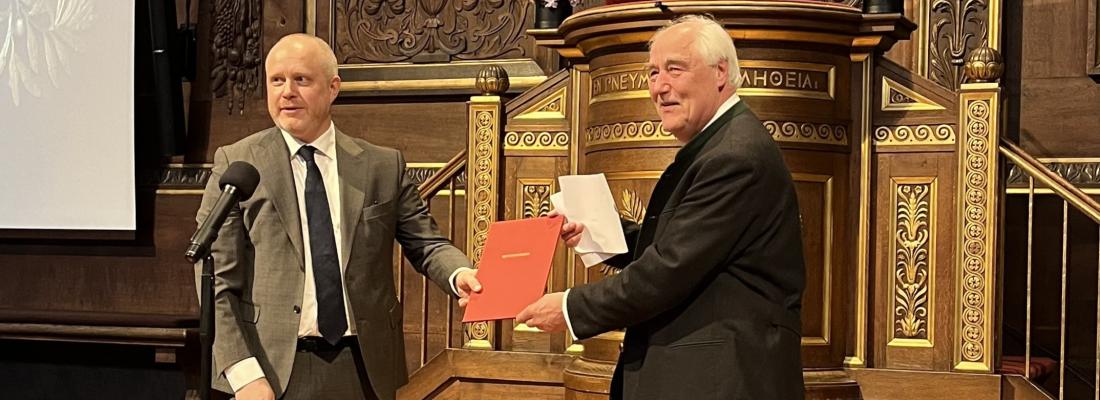Hervé This, winner of the Sonning Prize 2025: when science encounters culture
Published on 10 April 2025

This Danish cultural prize, worth 1 million Danish Krone (around €135,000), is awarded every two years and acknowledges major contributions to the influence of European culture. The prize was founded by the Danish author and editor C.J. Sonning (1879-1937), and winners have been chosen by the Sonning Foundation since 1950. Previous recipients have notably included Niels Bohr, Albert Schweitzer, Lars von Trier, Michael Haneke, Renzo Piano, Günter Grass, Karl Popper, Simone de Beauvoir and Winston Churchill.
The work carried out by Hervé This has revolutionized European gastronomic culture. Through several bestsellers, such as Casseroles et éprouvettes (Molecular Gastronomy) or Les secrets de la casserole (Kitchen Mysteries), Hervé This revealed the chemical and physical mechanisms underlying culinary transformations, which he has also explored with professionals during the seminars he has been organizing for more than 25 years. Technical applications (‘molecular cooking’, or ‘note-by-note cooking’) have since been employed by the greatest chefs throughout the world.
The principal aim of ‘molecular cooking’ was to update culinary techniques: low-temperature cooking, mousses, liquid nitrogen, rotary evaporators, ultrasound probes, etc. At the same time new gelling agents were introduced, which proved particularly useful when gelatine was banned during the mad cow crisis. This new approach to traditional or classic culinary preparations first of all offered new taste and sensory experiences, but above all it led to a rationalization of food preparation.
See the recipes compiled by Pierre Gagnaire, based on Hervé This’ inventions and presented during the Salon international de l’Agriculture in 2020: truffled eggs, apple feuilleté, egg parfait, citrus mousse or parsley pasta.
“Molecular cooking is an art that uses foods to stimulate the senses and trigger emotions”, indicated Karl Anker Jørgensen, Professor at the University of Aarhus, Marie-Louise B. Nosch, Professor at the University of Copenhagen, Steffen Brandt, musician, Erik A. Frandsen, artist and Birgitte Nauntofte, President of the Board of the University of Aarhus, who awarded the Sonning Prize to Hervé This.
Hervé This also invented the concept of ‘note-by-note’ cooking (1994) which consists in using pure components extracted from foods or synthesized, such as water, proteins, cellulose, glucose, citric acids or food colorants, etc. By combining them, entirely tailor-made dishes can be obtained because it is possible to choose the nutrients or the taste, etc. This new type of cooking should become particularly useful in a context of reducing food waste and losses as we anticipate increases in the number of mouths to be fed in future decades.
Mini-CV
- Physical chemist at INRAE
- Consultant Professor at AgroParisTech
- Director of the INRAE-AgroParisTech International Centre for Molecular and Physical Gastronomy (Centre international de gastronomie moléculaire et physique AgroParisTech-Inrae) and editor of the International Journal of Molecular and Physical Gastronomy
- Scientific Director of the Foundation for Food Science and Culture (Fondation Science & Culture Alimentaire),
- Chair of the Training Committee at the Institute for Advanced Studies in Gastronomy (Institut des Hautes Études de la Gastronomie)
- Scientific Advisor to the journal, Pour la Science
- Member of the French Academy for Agriculture (Académie d’Agriculture de France), and Editor of Notes Académiques
- Chair of the French group for Food Chemistry and Taste (Groupe Français de Chimie des Aliments et du Goût (Chemical Society of France; Société Française de Chimie)
- Member of the Board of the Académie d'Alsace
- Corresponding member of the Royal Academy of Science, Letters and Fine Arts of Belgium
- Awards and distinctions: Prix Franqui, Knight of the Legion of Honour (Chevalier de la Légion d'Honneur), Officer of the French Academic Palms (Officier des Palmes académiques), Commander of Agricultural Merit (Commandeur du Mérite Agricole).
